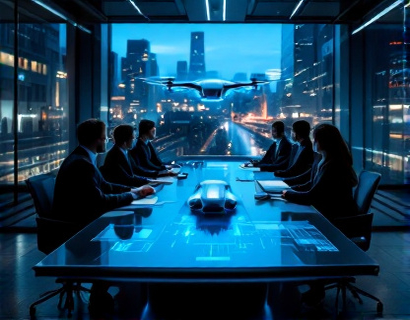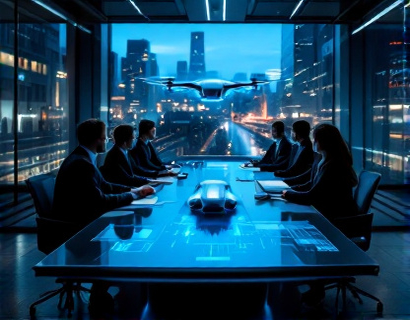AI-Powered Agent Transforming Aeronautics: Enhancing Efficiency and Decision-Making for Industry Professionals
The aeronautics industry, a cornerstone of global transportation and commerce, is undergoing a significant transformation driven by the integration of artificial intelligence (AI) technologies. AI-powered agents are revolutionizing the way aeronautics businesses operate, offering unprecedented levels of efficiency, enhanced decision-making, and tailored insights. This article delves into the transformative impact of these intelligent agents, exploring how they are reshaping the industry for professionals and companies aiming for sustainable growth and a competitive edge in a dynamic market.
The Role of AI in Aeronautics
AI technologies, including machine learning, natural language processing, and predictive analytics, are being leveraged to address the complex and multifaceted challenges faced by aeronautics businesses. These technologies enable the automation of routine tasks, the analysis of vast datasets, and the provision of real-time insights, all of which contribute to optimizing operations and enhancing overall performance.
Streamlining Operations
One of the primary ways AI agents are transforming the aeronautics industry is through the streamlining of operations. Traditional processes such as maintenance scheduling, flight planning, and supply chain management are often time-consuming and prone to human error. AI agents can automate these processes, reducing the time and resources required while minimizing errors. For instance, AI can predict maintenance needs based on historical data and real-time sensor inputs, ensuring that aircraft are serviced proactively and reducing downtime.
Moreover, AI-powered systems can optimize flight routes in real-time, taking into account factors such as weather conditions, air traffic, and fuel efficiency. This not only enhances the safety and reliability of flights but also reduces operational costs and environmental impact. By automating these tasks, aeronautics companies can focus on higher-value activities, such as strategic planning and innovation.
Enhancing Decision-Making
Decision-making in the aeronautics industry is critical and often complex, involving multiple stakeholders and a wide range of data sources. AI agents provide a significant advantage by offering data-driven insights and predictive analytics. These tools can analyze vast amounts of data from various sources, including historical flight data, weather patterns, and market trends, to provide actionable recommendations.
For example, AI can help in forecasting demand for flights, optimizing pricing strategies, and identifying new market opportunities. By leveraging machine learning algorithms, aeronautics companies can make more informed decisions, reducing the risk of errors and improving overall business performance. This data-driven approach ensures that decisions are based on accurate and up-to-date information, leading to better outcomes.
Tailored Insights for Unique Challenges
Every aeronautics business faces unique challenges, from regulatory compliance to customer satisfaction. AI agents are designed to deliver tailored insights that address these specific needs. By understanding the unique operational and market conditions of each client, AI can provide customized solutions that enhance efficiency and effectiveness.
For instance, an AI agent can analyze a company's fleet data to identify patterns and trends that may not be immediately apparent to human analysts. This can lead to insights on optimal fleet composition, maintenance schedules, and resource allocation. Additionally, AI can help in personalizing customer experiences by analyzing travel patterns and preferences, enabling targeted marketing and improved service delivery.
Improving Safety and Security
Safety and security are paramount in the aeronautics industry, and AI plays a crucial role in enhancing these aspects. AI-powered systems can monitor and analyze data from various sources, including aircraft systems, air traffic control, and environmental factors, to detect potential risks and anomalies in real-time. This proactive approach allows for swift action to be taken, minimizing the likelihood of incidents and ensuring the safety of passengers and crew.
Furthermore, AI can enhance security measures by detecting and preventing fraudulent activities, such as ticket tampering and identity theft. Machine learning algorithms can identify suspicious patterns and behaviors, alerting security teams to take appropriate action. This not only protects the company's assets but also builds trust with customers and regulatory bodies.
Driving Innovation
The integration of AI in the aeronautics industry is not just about improving existing processes; it is also a catalyst for innovation. AI enables the development of new services and products that were previously unimaginable. For example, AI-driven virtual assistants can provide personalized travel recommendations and support, enhancing the customer experience. Additionally, AI can facilitate the design and testing of new aircraft components and systems, accelerating the innovation cycle and reducing development costs.
Moreover, AI can play a key role in the development of autonomous aircraft and drones, opening up new possibilities in areas such as cargo delivery, surveillance, and environmental monitoring. These advancements not only drive technological progress but also create new business opportunities and revenue streams for aeronautics companies.
Case Studies and Real-World Applications
Several aeronautics companies have already begun to implement AI solutions with notable success. For instance, a major airline has deployed an AI-powered predictive maintenance system that has reduced maintenance costs by 20% and minimized flight delays. Another company has used AI to optimize its flight scheduling and routing, resulting in a 15% reduction in fuel consumption and a significant decrease in carbon emissions.
These case studies demonstrate the tangible benefits of AI in the aeronautics industry, from cost savings and efficiency gains to environmental sustainability. As more companies recognize the potential of AI, the adoption of these technologies is expected to grow, further transforming the industry.
Challenges and Considerations
While the benefits of AI in aeronautics are clear, there are also challenges and considerations that need to be addressed. One of the primary concerns is the integration of AI systems with existing infrastructure and processes. This requires careful planning and collaboration between technology providers and aeronautics companies to ensure seamless implementation and minimal disruption.
Another challenge is the need for skilled professionals who can develop, maintain, and interpret AI systems. The aeronautics industry must invest in training and development programs to build a workforce capable of leveraging AI technologies effectively. Additionally, issues related to data privacy, security, and ethical considerations must be carefully managed to build trust and ensure compliance with regulations.
Future Trends and Opportunities
The future of AI in the aeronautics industry is promising, with several emerging trends and opportunities on the horizon. One such trend is the increased use of edge computing, which allows AI processing to occur closer to the data source, reducing latency and improving real-time decision-making. This is particularly relevant for applications such as autonomous flight and real-time monitoring of aircraft systems.
Another area of growth is the integration of AI with other advanced technologies, such as the Internet of Things (IoT) and blockchain. IoT can provide a wealth of data from connected devices, while blockchain can enhance data integrity and security. Together, these technologies can create a more interconnected and resilient aeronautics ecosystem.
Furthermore, the focus on sustainability will continue to drive AI adoption in the industry. AI can play a crucial role in reducing the environmental impact of aeronautics by optimizing fuel usage, improving route efficiency, and facilitating the transition to cleaner energy sources. As the industry aims to meet global sustainability goals, AI will be an essential tool in achieving these objectives.
Conclusion
The integration of AI-powered agents in the aeronautics industry is transforming the way businesses operate, making processes more efficient, decision-making more informed, and innovation more accessible. By leveraging the capabilities of AI, aeronautics companies can gain a competitive edge, optimize operations, and drive sustainable growth. As the industry continues to evolve, the role of AI will become increasingly central, paving the way for a new era of aeronautical excellence.










































